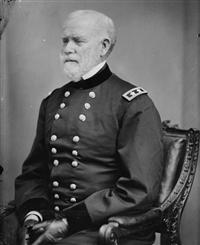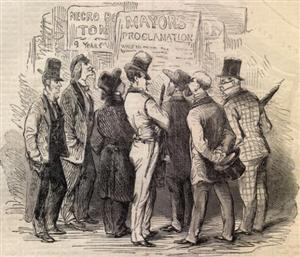Harney Restored To Command
Tour Stop

Following the Camp Jackson Affair, St. Louis was in a state of turmoil and on the brink of armed rebellion. Having been restored to command in St. Louis on May 11, 1861, Brigadier-General William Harney felt he had two main objectives: to maintain peace in the state and to keep the state within the Union. Harney immediately met with some of the leaders in Saint Louis to discuss this. They convinced Harney that the presence of the Federal Volunteer Regiments were keeping tensions high. On May 12th, Harney went to see Colonel Frank Blair at the Arsenal and informed him that he had decided to disband the Home Guard Regiments. Blair showed Harney the order from President Lincoln authorizing Blair to form the regiments. Blair insisted that Harney did not have the authority to disband the volunteer regiments. Harney acquiesced, realizing that he did not have the proper authorization. [84]
Pro-Southerners in St. Louis felt their city was occupied by a foreign army. The St. Louis Republican, a pro-southern newspaper, published the following statement on May 13th: [85]
We are bound hand and foot; chained down by a merciless tyranny; are subjugated and shackled.

Although calm had been restored to St. Louis since Harney's return, both sides were organizing armies to enforce their interests. On May 14th, Brigadier-General William S. Harney issued a proclamation as a warning to pro-Southern elements: [86]
To the People of the State of Missouri:
It is with regret that I feel it my duty to call your attention to the recent act of the general assembly of Missouri known as the “Military Bill,” which is the result, no doubt, of the temporary excitement that now pervades the public mind. This bill cannot be regarded in any other light than an indirect secession ordinance . . . its most material provisions are in conflict with the Constitution and laws of the United States . . . There are obligations and duties resting upon the people of Missouri under the Constitution and laws of the United States which are paramount, and which I trust you will carefully consider and weigh well before you will allow yourselves to be carried out of the Union under the form of yielding obedience to this military bill, which is clearly in violation of your duties as citizens of the United States . . . The whole power of the Government of the United States, if necessary, will be exerted to maintain Missouri in her present position in the Union.
Back: The Planter's House Hotel
Next: The Price-Harney Agreement
